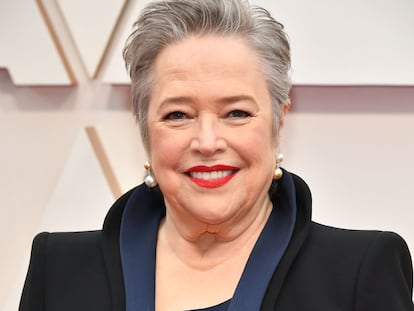
‘It was cruel, unnecessarily cruel’: How Kathy Bates became an unlikely star
She was over 40 and had a physique that was not normative for Hollywood, but her Oscar for ‘Misery’ led her to become one of the busiest actresses in Hollywood
When Daniel Day-Lewis read the name of Kathy Bates, rhere was some surprise in the Shrine Civic Auditorium. In the 1990 race to win the Oscar for Best Actress, she was up against Hollywood royalty (Anjelica Huston and Joanne Woodward), Academy favorite (Meryl Streep), and America’s new sweetheart (Julia Roberts). The press were not counting on her winning. At age 40, Bates was a virtual unknown. What’s more, she was nominated for playing a villain in a horror movie. Four decades later, her performance Annie Wilkes in Misery has become iconic, and there are no doubts that it was deserving of an Oscar.
That Oscar was also an award for perseverance. For a large part of the public, she was an unfamiliar face, but behind her splendid performance there were two decades of respected and award-winning work in the theater. This, however, made her no less invisible to the film industry. Tired of being ignored and realizing that Hollywood refused was not going to open its doors to her, she was forced to tear them down.
Prior to Misery — the movie adaptation of the Stephen King book —, Bates had seen how roles she had played on stage went to other actress when the productions were made into films. She wasn’t even given an audition. This happened with night, Mother, where after performing the role of Jessie Cates on Broadway for 11 months, Bates was overlooked for Sissy Spacek in the 1986 movie. And again in Crimes of the Heart, where Diane Keaton was given the lead role.
“I got tired of developing material for Sissy Spacek and other stars,” she told The New York Times. “So I told myself, ‘Let me see what I can do with this.’” After 11 years in New York, she moved to Los Angeles, but that didn’t mean things were going to change any time soon. She still had to go through one of those humiliating experiences that mark a career.
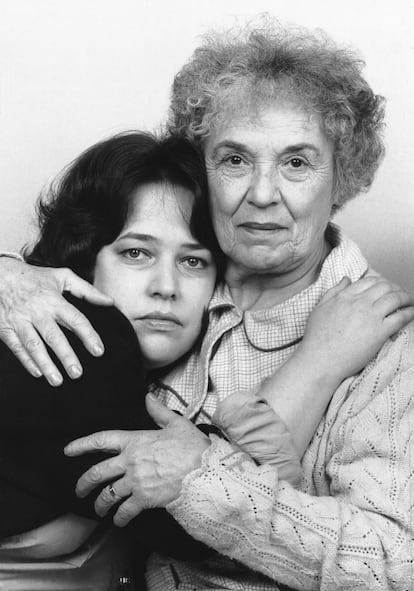
Promotional portrait of Kathy Bates and Anne Pitoniak in the Broadway play 'night, Mother', 1983.BROWNIE HARRIS
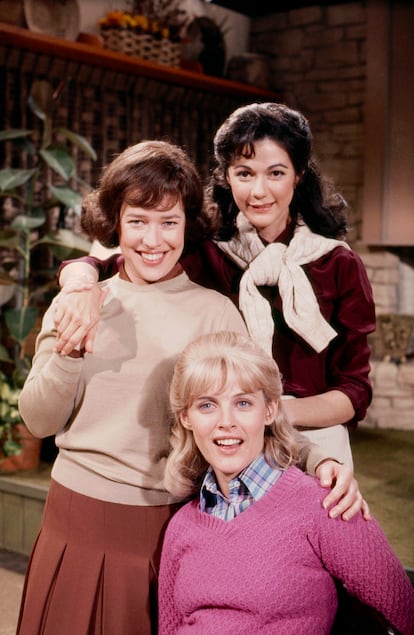
Kathy Bates, Margie Impert and Andrea Howard in the 1977 television movie 'Vanities'.
If there was one role that had built her reputation on Broadway, it was that of Frankie, the disheveled waitress in Frankie and Johnny in the Clair de Lune. Frankie was the kind of woman who asks her boyfriend to turn off the lights because she feels self-conscious about her physique. She’s a nondescript person, used to being invisible and resigned to never having felt desired. Playwright Terrence McNally wrote the role specifically for Bates, and she responded with a masterful performance. After the play’s overwhelming success, there soon rumors of a film adaptation. The role of Frankie’s partner Johnny — a chatty ex-convict cook — had been played by F. Murray Abraham on the stage. But for the film, they cast Al Pacino, an undisputed star, but also a guy who, like Murray, could fit in behind the bar of a nightclub.
However, when it came to Frankie, they chose Michelle Pfeiffer — an actress known for her stunning looks — to play a woman self-conscious about her parents. Bates told Interview that when she found out that Pfeiffer was going to be Frankie, she laughed “hysterically.” “I was in Brazil, and it was 6 a.m. I went down to breakfast and handed the fax around the table to my pals and said, ‘You’ve got to read this!’”
Indeed, Pfeiffer was a name that Bates heard frequently. “When I first went to interview for Misery, they were saying things like, ‘You’re not Michelle Pfeiffer, you know.’ And I just don’t get the relevance of that remark. I’m not Elizabeth Taylor, either. I’m not Sean Connery. I don’t understand why it’s so importation to compare people to Michael Jackson or to Madonna, or whoever.”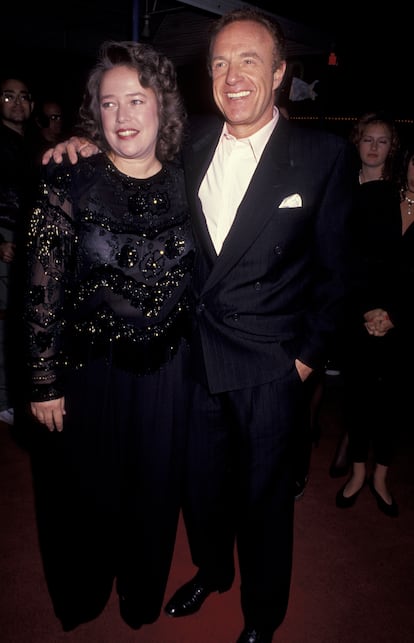
Kathy Bates and James Caan at the premiere of 'Misery' in 1990.RON GALELLA, LTD. (RON GALELLA )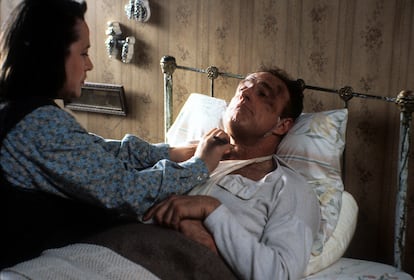
Kathy Bates and James Caan in a scene from 'Misery' (1990).ARCHIVE PHOTOS (GETTY IMAGES)
But the movie Frankie and Johnny in the Clair de Lune was not able to repeat the success of the Broadway production, and no one failed to highlight the obvious: that despite her unquestionable talent, Pfeiffer had been miscast. Garry Marshal’s film made little impact. Perhaps reading the negative reviews wasn’t enough consolation for the snubbed Bates, but polishing her Oscar in the meantime surely alleviated some of her resentment.
Kathy Bates was aware that her physical appearance had affected her career. “I have always had a problem with my weight,” she admitted to The New York Times. “I’m not a stunning woman. I never was an ingenue; I’ve always just been a character actor. When I was younger it was a real problem, because I was never pretty enough for the roles that other young women were being cast in. The roles I was lucky enough to get were real stretches for me: usually a character who was older, or a little weird, or whatever. And it was hard, not just for the lack of work but because you have to face up to how people are looking at you.”
That not-so-subtle discrimination was no surprise to her: in her youth she had gone through several episodes of depression and she herself admits that she found flirting difficult. She was a teenager who locked herself in her room and spent her time composing sad songs. But that did not stop Bates from pursuing a job with as much public exposure as acting. After graduating from theater school, she moved to New York, where she began to consolidate her name in the theater circuit, while playing small TV roles in series such as The Love Boat and L.A. Law and waiting for an opportunity to make the leap to the big screen.
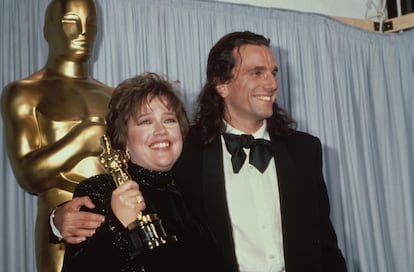
Kathy Bates with the Oscar she won for 'Misery' with actor Daniel Day-Lewis in 1991.VINNIE ZUFFANTE (GETTY IMAGES)
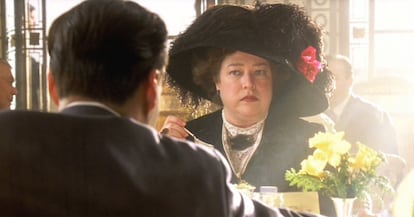
Kathy Bates in 'Titanic'.CBS PHOTO ARCHIVE (CBS VIA GETTY IMAGES)
Although today it is impossible to think of another person playing Annie Wilkes — the psychotic fan in Misery who first helps then kidnaps a novelist — the role almost went to Anjelica Huston, who ended up turning it down to film The Grifters. Bette Midler was also offered the part, but she passed on it because she thought it too violent. That’s when screenwriter William Goldman pressured Rob Reiner to give the woman he had in mind while adapting Stephen King’s book a chance. Bates didn’t take long to win Reiner over. “She had a whole scene prepared. After the first line, I was like ‘You don’t have to read; I know you’re great — you have the part,’” he recalled.
It could have been the beginning of a fairytale story, but we know from Goldman that the shooting was no bed of roses. There were no broken ankles, but James Caan’s acting style — based on intuition and improvisation — clashed with the iron discipline of Bates, who was used to long days of rehearsals from her days in theater and always wanted to know a little more about her character. Her effort paid off. The critics loved her performance.
“Firstly, she is not a face we know, which aids rather than undermines conviction. Secondly, she is not your conventional American screen actress, glamorous unto death. She almost looks like a real person the sort you might find in a deserted area of Colorado in comfortable snow boots. Thirdly, she is a fine actress who knows that less in the way of a ‘performance’ is often more and that strong moments have to be severely rationed,” praised The Guardian.
Bates had become an icon of horror cinema without needing a mask, makeup, or prosthetics. Her performance put Annie Wilkes on the same level as Norman Bates and Hannibal Lecter and like them, she is named on the American Film Institute’s list of the 100 Greatest Villains.
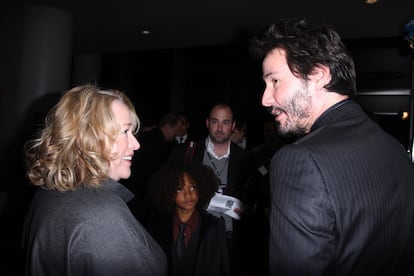
But it didn’t take long for the old ghosts to surface. Barely a week after finishing filming Misery, she went to Brazil to play the docile wife of a missionary in At Play in the Fields of the Lord, a film that failed in all respects, however, many critics preferred to focus on Bates’ physique rather than on the clumsy work of its director, Héctor Babenco. “Enormously overweight” and “unattractive” was how John Simon described her in his review in Playbill.
Many years later, the actress said she was so distraught at how she was treated by a journalist at a press conference that when it was over she went up to her room to cry. She did not finish the promotional tour despite the producers’ pleas for her to be tougher in the face of criticism. “I got on a plane and went home. It was so cruel, so unnecessarily cruel,” she recalled in The Guardian.
She overcame criticism by displaying her incredible versatility. She was one of the first female characters to deal with menopause in Fried Green Tomatoes; she wore a corset and starred alongside Madonna and Jodie Foster in Shadows and Fog (1991), Woody Allen’s homage to Fritz Lang’s films; she worked with Allen again, playing Gertrude Stein in Midnight in Paris (2011), and she played the title role in another Stephen King movie adaptation, Dolores Claiborne, which she believes is underrated. This was Bates’ favorite part.
The actress received another Oscar nomination for her role in Primary Colors (1998), Mike Nicols’ political satire about the rise of the Clintons, and a third for her candid role in About Schmidt (2002). The scene where she is in a bathtub with Jack Nicholson became one of the most talked about of the year (Nicholson’s less than Apollonian physique received fewer comments). “I was at the premiere... and there are a lot of women who are shouting, ‘You go, girl!’. I think there are a lot of women in the audience who are thrilled to see a real woman up on the screen in all her glory,” Bates told Hello magazine.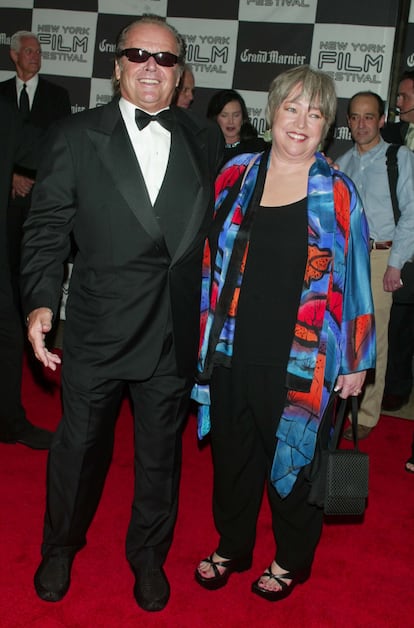
Jack Nicholson and Kathy Bates at the premiere of 'About Schmidt.'JIM SPELLMAN
“Kathy Bates would shudder at the idea of herself as a crusader for the rights of full-bodied women,” wrote Ruthe Stein. “Nonetheless, her nude scene in the forthcoming About Schmidt will surely pave the way for large actresses to feel OK about shedding their clothes onscreen.”
Before accepting the scene, Bates said that she discussed with director Alexander Payne exactly what part of her body would and would not be shown and that the two had come to an agreement. And before entering the bathtub, she drank a Cosmopolitan “to relax just enough.”
And then her career came to a halt. It was not that her phone had stopped ringing, but rather because she had ovarian cancer. She didn’t announce it. She only stopped working when chemotherapy made it impossible for her to go on set. Just a decade later, she was diagnosed with another cancer, this time breast cancer, which she describes as a “punch in the gut.” She thought her career had come to an end, she had a double mastectomy and overcame the disease, but since then, she has suffered from lymphedema, a little-known but not uncommon disease.
Since then, raising awareness about this disease and lobbying for funding for research has been one of Bates’ top priorities. After her health battles, Bates received more bad news. NBC canceled her series Harry’s Law, in which she played a peculiar lawyer who practices out of a shoe store. “Our audience was dismissed because they were too old. So the message I was getting was, get the fuck out of here! You’re too old, or you’re sick, you don’t have any more tits, you had ovarian cancer, nobody wants you anymore. That was in my head,” she told Vanity Fair.
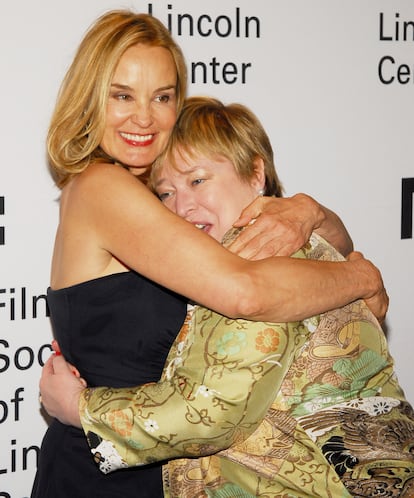
Jessica Lange hugs Kathy Bates during a tribute to the actress.JAMIE MCCARTHY
Bates is clear about who she has to thank for her comeback: “Ryan Murphy has resurrected my career.” A fan of American Horror Story, which is directed and written by Murphy, Bates called her friend Jessica Lange for breakfast one day and asked her to talk to Murphy about the possibility of working together. Murphy jumped at the chance: her first role under the director was playing the terrifying Madame Delphine LaLaurie in American Horror Story: Coven. Since that first collaboration, the two have worked together on many other projects. “Because of Ryan, my career opened,” Bates told Vanity Fair. “He brought me back to life during a difficult period in my life.”
The movie industry has not forgetten her either. After recovering, she continued working with the same intensity. Her latest Oscar nomination was for playing the devoted mother in Richard Jewell (2019) by her hero, director Clint Eastwood, who was the main reason she accepted the role. “I think I said, ‘I’m happy to just get him coffee,’” she told Readers Digest, on her reply on being offered the part.
Bates — who turned 76 on June 28 — is still keeping busy. Last year, she was part of the adaptation of Judy Blume’s novel Are You There, God? It’s Me, Margaret? and this year, she stars in the romantic comedy A Family Affair, alongside Nicole Kidman and Zac Efron. Also coming out this year is Thelma, the story of the struggle of Thelma Toole, the mother of the author of A Confederacy of Dunces, to see her son’s work published, and Matlock, a remake of the 1980s series, where she will once again play a lawyer. Kathy Bates’ career is still in great shape. She thinks it is because she is a normal woman audiences can relate to, but really it is because she is an extraordinary actress.
Biographies / Kathy Bates
New Again / Kathy Bates
Kathy Bates / 'I told Clint that after 50 years, I feel like I've hit the big time'
Interview / Kathy Bates
‘It was cruel, unnecessarily cruel’ / How Kathy Bates became an unlikely star

.jpg)

No comments:
Post a Comment